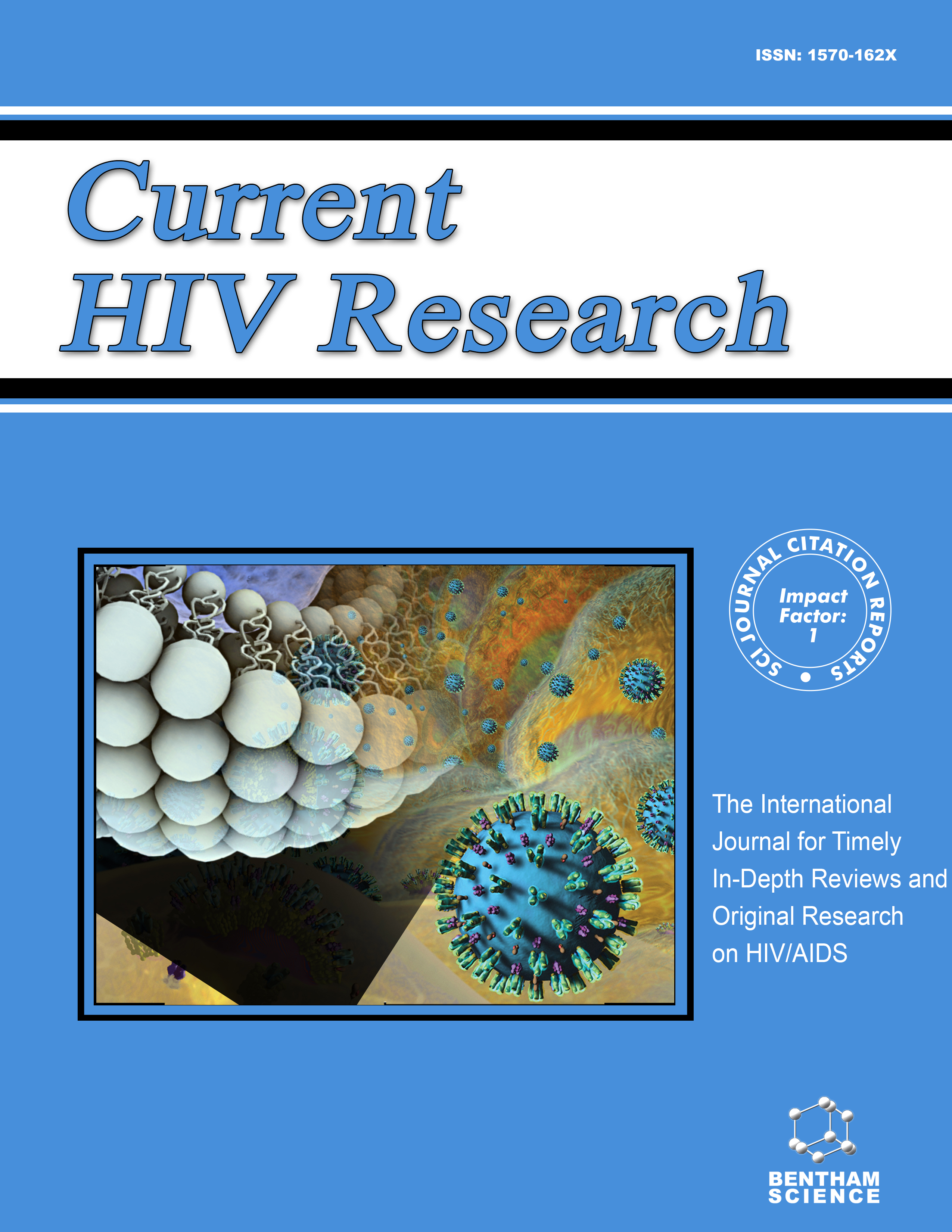- Home
- A-Z Publications
- Current HIV Research
- Previous Issues
- Volume 15, Issue 3, 2017
Current HIV Research - Volume 15, Issue 3, 2017
Volume 15, Issue 3, 2017
-
-
HIV Risk Behavior and Prevention Considerations Among Military Personnel in Three Caribbean Region Countries: Belize, Barbados, and the Dominican Republic
More LessAuthors: Nakisa Asefnia, Lisa Cowan and Rose WerthBackground: We review research findings and the limitations of recent qualitative and quantitative studies of HIV prevalence and risk behaviors in military populations in three Caribbean countries (Dominican Republic, Belize, and Barbados). Methods: This research shows how mental health issues, disordered substance use, and structuring aspects of the occupational field produce and reproduce patterns of risk behaviors. Re Read More
-
-
-
The Importance of Military Conscripts for Surveillance of Human Immunodeficiency Virus Infection and Risk Behavior in Thailand
More LessAuthors: Kenrad E. Nelson and Ram RangsinBackground: The epidemic of Human Immunodeficiency Virus (HIV) infection in Thailand began in 1988 among Injection Drug Users (IDUs) in Bangkok. It soon spread to other populations, especially Female Sex Workers (FSWs) and men attending STD clinics. Routine serologic surveillance for HIV began among military conscripts in 1991. The HIV seroprevalence data from military conscripts provided national surveillance d Read More
-
-
-
Building a Successful Military-to-Military Partnership through Confronting HIV: The U.S-Nigeria Experience
More LessBackground: The Nigerian Ministry of Defence-Walter Reed Army Institute of Research partnership was established in 2004 in response to the growing HIV/AIDS epidemic in Nigeria. Methods: Here we discuss the emergence of HIV in Nigeria, highlighting the initial barriers to treatment delivery, and outline the origins of the international military-to-military partnership developed to confront the disease. Results: With fina Read More
-
-
-
Analysis of Site Heterogeneity and HIV Outcomes Across Rural and Urban Study Sites in Phidisa II - A Multi-site Randomized Controlled Antiretroviral Treatment Trial in a South African Military Cohort
More LessBackground: Clinical trials frequently enroll subjects from different study sites. Few such studies provide analysis by individual site. Between 2004-2007, the South African Military Health System (SAMHS) established 6 research sites (3 urban, 3 rural) to build capacity for clinical research and HIV care. We explore differences in clinical, virologic and CD4 outcomes by site in the context of a randomized controlled trial. Methods: Phid Read More
-
-
-
Short-Term Transfer of Knowledge Assessment in the Military International HIV Training Program (MIHTP)
More LessAuthors: Michael Grillo, Kelly Woodland, Gregory Talavera, Richard Shaffer and Stephanie BrodineBackground: The Military International HIV Training Program (MIHTP) was established in 2002 to address the overwhelming needs of international military personnel concerning HIV and AIDS prevention, care, and treatment. The purpose of this study was to determine shortterm knowledge transfer in trainees attending the MIHTP by comparing data collected from pretraining and post-training knowledge assessments. Metho Read More
-
-
-
Antibody Functional Assays as Measures of Fc Receptor-Mediated Immunity to HIV - New Technologies and their Impact on the HIV Vaccine Field
More LessAuthors: Bruce D. Wines, Hugh Billings, Milla R. Mclean, Stephen J.Kent and P. Mark HogarthBackground: There is now intense interest in the role of HIV-specific antibodies and the engagement of FcγR functions in the control and prevention of HIV infection. The analyses of the RV144 vaccine trial, natural progression cohorts, and macaque models all point to a role for Fc-dependent effector functions, such as cytotoxicity (ADCC) or phagocytosis (ADCP), in the control of HIV. However, reliable assays that can be reprod Read More
-
-
-
Atazanavir Plus Cobicistat: Week 48 and Week 144 Subgroup Analyses of a Phase 3, Randomized, Double-Blind, Active-Controlled Trial
More LessObjectives: Cobicistat (COBI) enhances atazanavir (ATV) pharmacokinetic parameters similarly to ritonavir (RTV) in both healthy volunteers and HIV-infected adults. Primary efficacy and safety outcomes of this Phase 3, international, randomized, double-blind, double-dummy, active- controlled trial in HIV-1-infected treatment-naïve adults (GS-US-216-0114/NCT01108510) demonstrated that ATV+COBI was non-inferior to ATV+RT Read More
-
-
-
CD4+ T-cell Count may not be a Useful Strategy to Monitor Antiretroviral Therapy Response in HTLV-1/HIV Co-infected Patients
More LessBackground: HTLV-1/HIV co-infection is known to elevate the CD4+ T-cell counts of treatment-naïve persons. We investigated whether HTLV-1/HIV co-infected patients continued to have elevated CD4+ T-cell counts after developing virologic failure on antiretroviral therapy (ART). Methods: The data is taken from a drug resistance study located in the KwaZulu-Natal province of South Africa. All participants (N=383) presented for Read More
-
Volumes & issues
-
Volume 23 (2025)
-
Volume 22 (2024)
-
Volume 21 (2023)
-
Volume 20 (2022)
-
Volume 19 (2021)
-
Volume 18 (2020)
-
Volume 17 (2019)
-
Volume 16 (2018)
-
Volume 15 (2017)
-
Volume 14 (2016)
-
Volume 13 (2015)
-
Volume 12 (2014)
-
Volume 11 (2013)
-
Volume 10 (2012)
-
Volume 9 (2011)
-
Volume 8 (2010)
-
Volume 7 (2009)
-
Volume 6 (2008)
-
Volume 5 (2007)
-
Volume 4 (2006)
-
Volume 3 (2005)
-
Volume 2 (2004)
-
Volume 1 (2003)
Most Read This Month
Article
content/journals/chr
Journal
10
5
false
en


